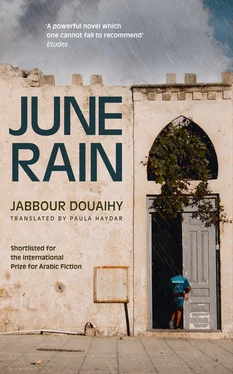We moved forward in line until we got close to the building. When we went by them, the door to the office of the military district commander was open and the men gathered inside were laughing out loud, exchanging pleasantries and possibly some jokes.
One of the men in attendance at the meeting from beginning to end later told us all the details. How they came in and shook hands and hugged each other — except for the Rami family headman who said he had a bad cold and didn’t want anyone to catch it so he declined hugs and restricted himself to handshakes. And someone had brought a bottle of champagne that two men raced to open. In all their excitement, the cork popped off and hit the director of the northern branch of the military intelligence service right in the ear as he was turned talking to the lawyer. The bottle bubbled over and they rushed to fill their glasses and drink a toast to Lebanon first. They were all standing as Henry Beyk made the toast. Then they drank a toast to the new President of the Republic, the former chief of staff of the army. Our headman suggested they drink a toast to Barqa and everyone enthusiastically agreed.
When it was almost my turn in line and there was no one but the fat lady ahead of me, I offered the Ghandour to go ahead of me and he accepted. The soldier behind the desk didn’t ask the fat lady for her ID. She gave him her name and he found it on the list. He told her to sign and she said she didn’t know how to write, so she dipped her finger in the inkwell, made a fingerprint and he gave her a cheque. The Ghandour fingerprinted as well. He wasn’t happy with the small sum and so he spouted off a string of curses. I was still worried about being seen by my uncle’s wife as I received the cheque from the soldier’s hand. I needed the money because as soon as I’d heard we would be included in the compensation I borrowed money in advance against it and had already spent all of it.
But I didn’t escape her after all. I bumped into my uncle’s wife on my way back from the office. She was standing there waiting. Waiting for us — me and my brother, too, probably. I didn’t look in her direction, but I heard her say in a loud voice, ‘I hope you’ll have to use that money to buy medicine!’
Kamileh will get out of bed at the crack of dawn. Each day it becomes a little more difficult than the day before. She feels cold the moment she throws off the blankets; the river is near but the sun is still far off.
She will repeat the same actions, the ones of her darkened life.
She will die the day she changes a single letter of a single word of it. She imagines she will die in her sleep.
Each day she reviews what will happen, in great detail:
She will lie down to sleep one night in good health and not wake up the next morning. Around noon the neighbours will notice she hasn’t come out to the balcony and that the door and all the windows are still shut. They will come over with some trepidation and knock at the door as they whisper to each other. She won’t hear. They will call to her, a little louder each time, but she won’t hear. They’ll go to her bedroom window and pound on it, calling out to her, but she won’t hear. Everyone will come. They will summon her friend Muntaha from her house, and the moment they call to her, Muntaha will know that Kamileh is dead. Kamileh has taken precautions for that morning when they will call her and she won’t answer and they’ll knock at her door and she won’t open. She’s taught Muntaha how to open the kitchen door so they won’t have to pry it off. She’ll reach in through the back window, tug on the rope tied to the door latch and the door will open. They will come into the bedroom, whispering, and there they will find her. Upon seeing her, Muntaha will be the only one to let out a cry of grief. ‘Don’t weep for me. Just stop the neighbours from stealing everything in the house. Lock up the gold bracelets and necklace, and Yusef’s things.’ Yusef, her husband.
But today she isn’t going to change anything, especially not today.
She slept with peace of mind knowing that she’d prepared all of Eliyya’s provisions without forgetting a thing — a suitcase filled with food just like the one she sent him off with on his first trip when she followed him all the way to the gate area at the airport and no one had been able to stop her.
On this day she will fight to keep on going. She turns on the dim kitchen light even though she hasn’t been able to tell the difference for a long time. If she didn’t turn the light on, she would not begin the day. Still under the veil of sleep, she sets the coffee pot on the small burner, the front right one. She stands there and waits until she hears the water boil, tosses in two and a half teaspoons of ground coffee and raises the pot up from the burner so it won’t boil over. She can hear it bubble up before it boils over. Over time she’s come to hear sounds she didn’t used to hear before — the flapping of the swallow’s wings on spring days and the sound of the toilet flushing at the Aasis’ house. She raises the coffee pot high above the stove to allow it to foam up. She turns off the gas, turning the valve of the propane canister. After every use she turns the propane canister off and sometimes she even gets out of bed at night to make sure she’s shut the gas off. She places the pot of coffee on the serving tray along with two earless cups turned upside down. Always two cups, turned over, even though she isn’t expecting anyone to join her for morning coffee. Muntaha would still be asleep at that hour. Kamileh goes back to her room, puts on her dress and easily gropes her way to her seat out on the balcony, because she can sense the light. In the past she used to like to wait for day to break behind the high mountains. Now, too, she sits in the same spot. She pours half a cup of coffee, drinks it and pours some more. She even drinks the dregs from the bottom of the cup. She carries the tray and the coffee pot to the kitchen, washes them and puts them away. She fills a bucket with water and goes back to the balcony to water the flowers and the plants before the sun gets to them first. She will only change the details of her daily routine when she is tired of it all, on the day when she no longer feels like getting up the next morning.
Ibrahim al-Halabi is the first to pass by, the first to wake up and leave the house at dawn. He slows down when he reaches the balcony, Kamileh returns the greeting without extending the conversation beyond that. He always has something to say. He always wakes up early to go and stand in the town square, in front of the bookshop, and slowly sip a cup of coffee he buys from the coffee vendor. He watches the town wake up and watches people going into the store to buy the morning paper or pay for lotto tickets, and he watches the government building open its doors across the street. Once people start going to work, Ibrahim al-Halabi’s day comes to an end. He closes up and heads home around nine in the morning, not going back out until dawn the next day. If he’s said hello to Kamileh on his way by early in the morning, he won’t feel obliged to say anything as he totters back home. It was sufficient to merely look up at the balcony and make sure Kamileh was still where she ought to be on the balcony, watering her plants and drinking her coffee. This, in turn, would give him peace of mind that life was running its normal course and he’d won one more day just like the day before. A day whose beauty only people like him understood — people in good health on the brink of the final departure.
After a bit the school teacher follows, clip-clopping in her high heels. One time she greeted Kamileh, but Kamileh didn’t reply or didn’t hear her, so now the teacher always walks past without saying hello. She walks past and does not even look in the direction of the balcony. Coldness suits Kamileh.
Читать дальше












